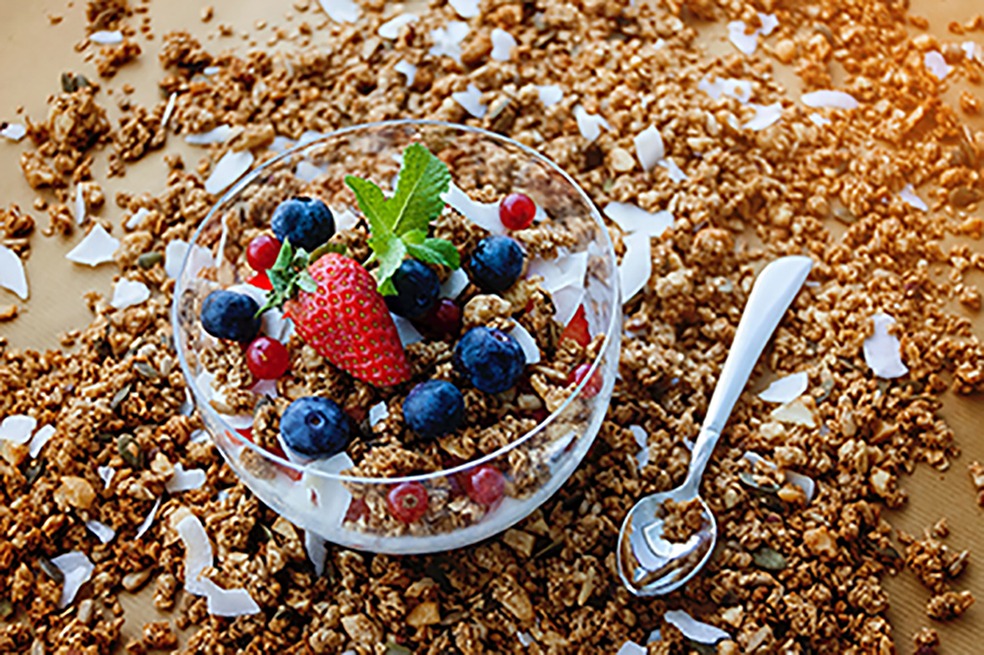Growing pains: feeding hungry teens
Eating well at any age is essential for good health, but when it comes to teenagers, they don’t just need nutritious food to stay healthy. The adolescent years are a critical period of growth and development, requiring increased nutrients like protein, calcium and complex carbs. The trouble is, while teens are usually always hungry, they’re also more likely to be eating the wrong foods more often. We consult a nutrition expert (and mother of teenagers) to find out the whats and whys of your teenager’s changing nutritional needs.
“Studies have indicated that about a quarter of the food teens consume is snack food,” says Susan McLeod, a nutritionist and lecturer in Human Nutrition at La Trobe University. “And often, those snacks are junk food, which are completely lacking in nutrients. It also means their diet is higher in salt, fat and sugar, so it has a double negative effect.”
The growth spurts that teenagers experience during adolescence have a direct impact on their nutritional needs, which increase in almost all aspects.
“Anyone who has a teenager will know that they have this non-stop, ravenous appetite,” McLeod says. “There are several reasons for this. During puberty, they have their peak height formation going on, their weight increases and their skeletal mass accumulation happens at this time. Their body composition changes significantly, and with all these changes going on, their nutrient intake needs to increase to match that.”

No bones about it
Adolescence is a crucial time for teens to develop their bone density, which will increase up until about the age 25 before it plateaus. After that, it’s just about maintenance – you can’t increase your bone density any further. This means teens really need to get things right if they want to reduce the risk of developing problems like osteoporosis in the future.
“Calcium, protein, phosphorus and vitamins D and K,” McLeod says. “Intake of all of these nutrients needs to increase during adolescence, to make sure that you develop a strong skeleton that can support your frame into adulthood.”
The adolescent years aren’t just a time of rapid growth, insatiable hunger and the sudden discovery that your parents are, like, soooo embarrassing. It’s also a time when teenagers start to rebel and act up, which can lead to poor life choices.
“Late teens tend to be less inhibited about their choices,” McLeod says. “Things like smoking and alcohol consumption can negatively impact bone density development. They can reduce calcium absorption, and slow the production of bone-forming cells.”

Shape shifters
Teenage boys and girls also start to change their body composition at this stage. Here, the way that boys and girls grow and develop is a little bit different.
“Girls tend to have a rapid growth spurt that lasts two to three years,” McLeod explains. “Not only do they have that height spurt, they start to put on fat. This is where they go from being straight up and down to that lovely curvy shape that’s more typical of a woman.”
This development of increased body fat is actually really important. Putting that fat on is what’s thought to trigger menstruation. But teenage girls are also often painfully self-conscious, and can become overly concerned with body image.
“This is another aspect of puberty which is often less thought of, that psychosocial development stage,” McLeod says. “So not only are they putting on fat, but they’re starting to feel more concerned about their peers’ opinions of them. But as they start to get curvy, and start to put on body fat – which is absolutely essential for their sexual maturity – this is also often coupled with changes in eating patterns.”
This is a time when girls have a higher rate of eating disorders, particularly among those who develop earlier than their peers. But skipping meals, strict dieting or excessive exercising can delay critical developmental stages, or even stop it completely.
When it comes to teenage boys, they are going through a major phase of muscle development. This means they need more protein – more than adults.
“Protein helps with that lean body mass development stage in boys,” McLeod says. “Especially if you’ve got active boys that are exercising a lot. They need protein to make sure their energy consumption is matching their output. That protein is helping to grow and maintain the muscles that they’re developing.”

The right start
It’s estimated that just over 50 percent of teenagers don’t eat breakfast. This doesn’t just mean they’re missing out on the essential nutrients that are found in foods we typically consume at breakfast – such as fibre, calcium and protein. If your teenager skips breakfast, this has a chemical knock-on effect on the rest of their day.
“There’s often tiredness or lethargy, and a lack of focus and attention, which you obviously need when you go to school,” McLeod says. “There’s also a link between the foods that you eat and the impact it has on your mood.
“Try breakfast foods like yoghurt, which is fantastic for your gut health, coupled with blueberries and almonds. These are all foods that have been linked to good mental health and reduce symptoms of depression and anxiety. If that’s the type of breakfast your teen is having, it’s going to have positive flow-on effects.”
But if they regularly skip breakfast, then eat fast food for lunch and snack on junk food for the rest of the day, for many teens this means that the dinner they eat at home is the only meal of the day where they’re getting any proper nutrients.

Be prepared
“I have two teenagers, and they’re really active,” McLeod says. “They have to eat breakfast before they leave the house, so I always make sure they have access to very convenient healthy food choices. I’ll keep a bowl of hard-boiled eggs in the fridge which they can grab and go. I’ll also always have yoghurt and berries in the fridge. It’s something that’s quick and easy for them to eat that doesn’t take a lot of preparation. I’m also big fan of things like oat-and nut-based muesli bars. I make a homemade version, but there are plenty on the market that are healthy. You just need to read the labels.”
McLeod also recommends stocking up on healthy snack options such as vegies like baby carrots and Qukes. You can put these in your teen’s lunchbox with some hummus. Salad sandwiches with cheese, chicken or egg are another way to ensure your teenager is getting another serve of vitamins, minerals and protein in their day. And you should never underestimate the value of a good old glass of milk.
“With a little bit of preparation and planning ahead, you can make sure that the majority of foods your teenager is eating meets their nutritional needs,” McLeod says. “Then you don’t have to worry so much if they do eat some junk food.
“I love an 80/20 rule. Eighty percent of the time they should make good decisions about what they eat; 20 percent of the time give them the freedom to have a treat.”









